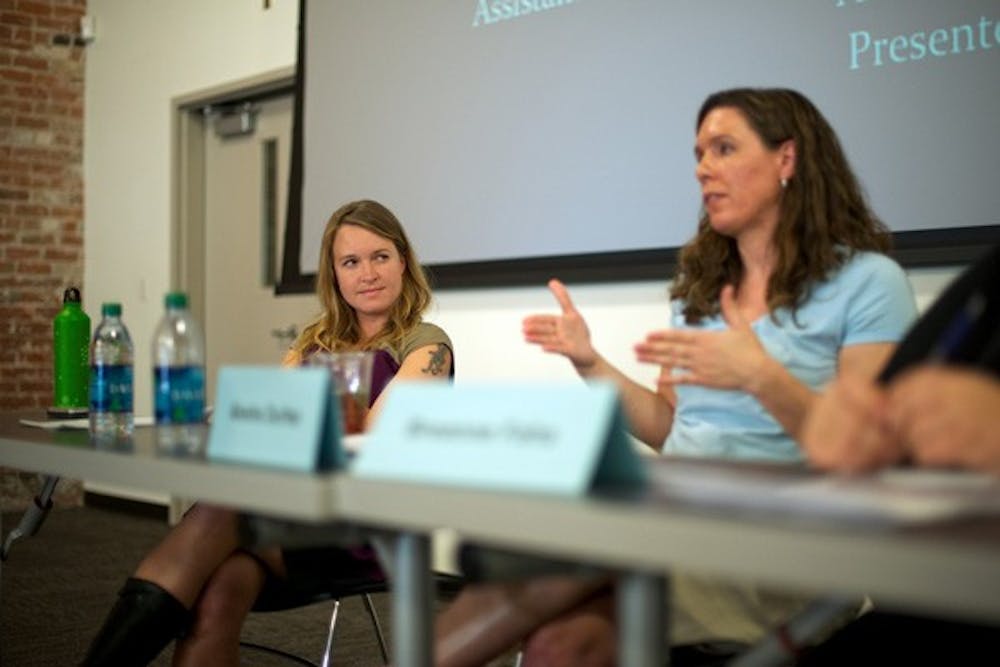Correction added.
Feminism is more than a woman’s issue, according to an ASU panel on modern-day feminism.
A small gathering of ASU students, professors and community members listened and participated in a panel discussion Friday on feminism, women’s bodies and sexuality, and the need for all people to be involved in the movement.
The discussion was held as part of the 2011 Female Contemporary Issues Summit at the Downtown campus.
The summit was created in fall 2008 to “educate and empower the ASU community about human and women rights,” said Nicole Bruno, outreach coordinator for the Woman as Hero club.
Woman as Hero began on the Downtown campus in fall 2009, Bruno said.
Bruno said Eichelle Armstrong, the director of Woman as Hero, saw a need for the topic of human rights and issues affecting women to be discussed more than just once a year.
The club helps create an overall awareness of problems affecting women today, Bruno said.
Each spring, guest speakers including ASU faculty, students and others who are active in the community are invited to share their ideas about women’s rights issues and hopefully get the public involved and mobilized about these issues, she said.
Bruno said feminism was chosen as a panel discussion topic because “there’s usually a big connotation with the word feminism.”
She said when people think of feminism, they usually think there is a lot of male bashing and it is all about women against men.
The workshop provides a space to explore what the word really means, she said.
Alesha Durfee, an assistant professor of Women and Gender Studies at ASU, began the workshop by discussing the reclamation of the word “feminism.”
Durfee is one of the two ASU professors who led the panel, along with one doctoral student from the Hugh Downs School of Human Communication.
Feminism today focuses on equality of women and also includes people of different races and sexual orientations, Durfee said.
The focal point of feminism is not just about women, but also about equal opportunities for all, she said.
Durfee added that for feminism to grow and succeed at ASU, the use of social media, like blogs and Facebook, is necessary.
“We need to start incorporating modern technology with the feminist movement,” Durfee said.
Breanne Fahs, also an assistant professor of Women and Gender Studies at ASU, spoke about the way feminism has shaped ideas of women’s bodies and sexuality.
“Problems women are facing within the feminism movement and outside of it is women hating their bodies,” she said.
Amy Pearson, a doctoral student at the Hugh Downs School of Research, read “Women Would Rather Die” and “I Love Myself,” two poems that she wrote.
Pearson, who helped lead the panel, said the poems explained her idea of the world’s view of women and how she personally has overcome those views.
“This might sound egotistical, but I love myself,” is the last line of the poem “I Love Myself.”
Overall, Bruno said she hoped the summit and discussion would promote “having a diverse and inclusive community on campus.”
Social work graduate student Jonel Thaller said she decided to attend the event because she thinks feminism is a relevant issue and was curious to see the panel’s take on it.
“I think that there’s still a lot of inequality that people don’t want to recognize,” she said. “There is still a pretty far way to go.”
The panel and the audience discussed the need for men to also be a part of the feminist revolution.
Bruno said Woman as Hero is not just a woman’s club and the problems they discuss, including feminism, apply to every person.
“This is everyone’s problem, it isn’t just for women,” Bruno said. “Men should be a part of the solution.”
Fahs said men are starting to step up and take part in feminism. She sees their participation in a lot of her classes.
“There is an awareness,” she said. “They realize inequality benefits no one.”
Reach the reporter at sophia.charchuk@asu.edu





